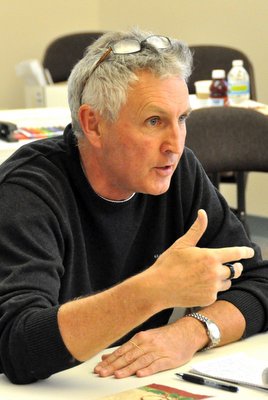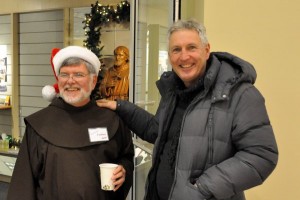Fr. Francisco O'Conaire, OFM, on JPIC Values

Fr. Francisco O'Conaire, OFM
What Can I Do?
His JPIC journey began with a simple question.
He clearly has the gift of gab, an Irish talent for conversation. But based upon his focus and his follow-up comments, it’s obvious that Fr. Francisco Ó Conaire, OFM, SJB’s General Visitor, is also a good listener. He’ll be doing a lot of listening in the next few months as he continues his tour of the province leading up to Chapter in May.
A native of Ireland and “a Central American by province,” Francisco is Executive Secretary of the Intercongregational Justice, Peace and Integrity of Creation Commission of the Superiors General of Women and Men Religious in Rome.
He animates the “promoters” who, in turn, animate others. “I organized workshops; we had a monthly publication with resources,” he says of the day-to-day workings of the office. One formation seminar included 28 participants from 22 nationalities and 24 congregations. “For many people, JPIC was just one of their hats,” a small part of the job.
For some friars, justice and peace is a peripheral part of religious life, an added responsibility for which they say they have no time. But in reality, JPIC is about who we are. “It’s about how we live our Christian faith,” Francisco says. “It’s about contemplation, my relationship with Jesus – it’s not just about activity.”
Those who think of peace and justice as “protesting and being against things” are missing the point, says Francisco, who has seen his share of confusion about what JPIC is and is not. In his role as Executive Secretary, “My work was to help others appreciate that it is not an optional ‘extra’ something we are called to live by. It starts with living in justice with ourselves. JPIC is about a whole way of life – the lens through which I try to live the Gospel. It’s about right relations with yourself and others.”
Think of yourself as a pond and of the ripples you create.
How peaceful a person are you?” Francisco says. “If you asked someone to evaluate you for the criteria of peace, the criteria of being a just person, what would they say about you” in terms of, for example, living in a connected way with creation? “If you evaluate yourself you’ll probably come up with an awful lot to work on.”

Provincial Minister Fr. Jeff Scheeler, OFM (in Santa cap) and Fr. Francisco O'Conaire, OFM, greet visitors at Northgate Mall in Cincinnati.
In his own life, Francisco was able to benefit from example. “My father was a man who, if he saw something that wasn’t right or someone would be doing something unjustly, he would be the first to raise his voice.” As a missionary, “What really focused my attention was when I went to Central America in 1984 and saw the suffering of the people, without basic needs to live in a dignified way, being killed because they raised their voices. I couldn’t avoid being involved; I was thrown into it. When I saw the level of violence, I thought, ‘What can I do so that one other person doesn’t have to go through that same fate?’”
For many, problems like climate change, human trafficking, contaminated water and immigration are a world away. The challenge is, “How to present a workable scenario so a friar can connect in a way that is relevant to them,” Francisco says. “What is a way I can become connected at a local level that makes sense?” The ultimate goal is conversion, “working to become non-violent men and women. That’s where the heart and core is.”
We can start by being compassionate listeners, like Francisco. As he learned in El Salvador, “We cannot disconnect ourselves from the people around us. When you become aware of suffering and marginalization, it impels us to live in a way that’s more just.”
Fr. Francisco talks about his work and the Order's commitment to JPIC in an online interview with Marie Pauline Meyer on Where God Weeps a weekly show produced by Catholic Radio & Television Network in conjunction with the international Catholic charity Aid to the Church in Need.
